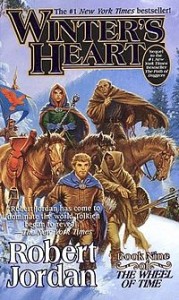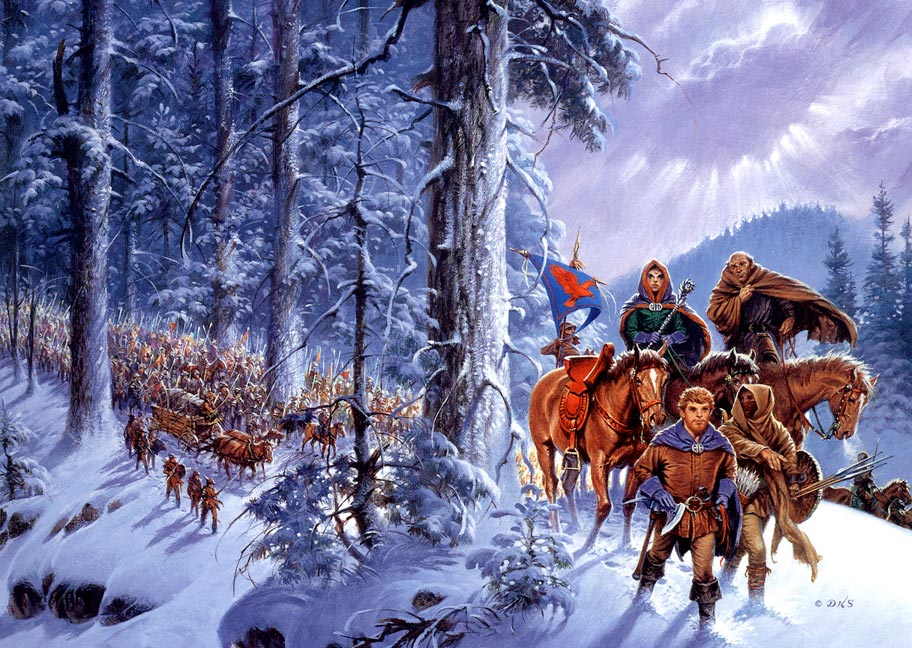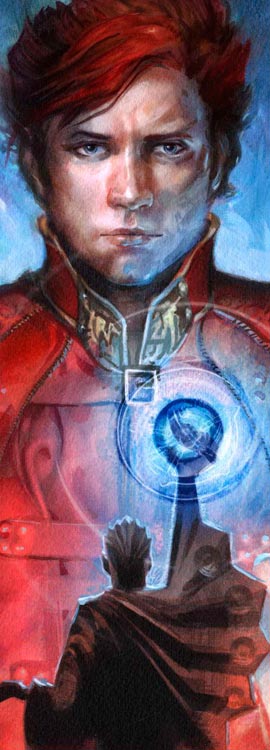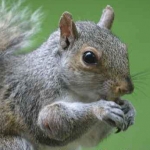
I have spent the past eight commentaries talking about where I was as a reader in my early-to-mid 20’s when I first read (and then re-read, in some cases more than twice) the first eight volumes of The Wheel of Time. For the first seven, I read them all within a two-week stretch in-between and just after my MA exams in November 1997. The eighth volume, The Path of Daggers, I bought on its release date and re-read either once or twice (memory is faint) before November 7, 2000, when the ninth Wheel of Time novel, Winter’s Heart, came out in the US.
The astute readers probably have realized by now that if I am talking about books last read around 10 years ago, then it must have been Winter’s Heart that gave me a long pause in my reading. That is indeed true, as not only was there a shade over two years to wait until the tenth volume, Crossroads of Twilight, but I never re-read any of the first nine in the interim, nor did I read that volume until 2006 on a lark. What happened in this reading that finally caused me to do the metaphorical throwing up of hands in surrender?
It felt as though the participants were arguing more about their own wish-fulfillments and “theories” about future events than talking about the literary merits of these books.
There are multiple causes for this. One cause is that as I was reading this novel for the first (and until now, only) time, I was going through some major changes in my life. I had decided that due to my fragile health (I have a tendency to contract severe bronchitis quite easily, especially if the temps rise and fall more than ten degrees Fahrenheit in a day, which is quite often here in Tennessee) that I would be moving out of state (I ended up living and teaching in South Florida for two years before resigning my position over a few issues and moving back home), so my mind was a bit distracted during those months after my initial desire to change locales began. Another cause, ironically enough, was my joining of a WoT fansite, wotmania, in October 2000 after months of lurking there. I’m never been much of an enthusiast for any one author (especially after grad school and all the literary eviscerations I had to perform), and seeing all of the more “fanatical” interpretations and the arguing about points of minutiae in a series that I was beginning to find more and more tedious to read despite the interesting premise just was too much. I stayed on at that website until its August 31, 2009 closing, but I rarely bothered being serious about any of the WoT arguments of the day because it felt as though the participants were arguing more about their own wish-fulfillments and “theories” about future events than talking about the literary merits of these books.

So I read this book and just…stopped. I could barely care anymore. Everything just felt so 2D when it could have been much more. And yet I never really thought at the time just what it was about this particular book that never interested me enough to re-read it, until now.
.This novel actively grated on my nerves at times just because it was here where all of the very poor narrative choices had their consequences come to roost.
 On the surface, Winter’s Heart is about as inoffensive as its predecessor, The Path of Daggers. There are the expected clothing descriptions, quirky mannerisms repeated in groups rather than just individuals, lengthy expositions on matters already known to perceptive readers several books before, and just one one event that seemed to have anything major to do with forwarding the plot. If the previous novel felt as though it were just a collection of middle chapters from a book that contained a few subplots, then this book until the end felt more like the middle of those middle chapters, with things just continuing on…and on…and on…without an end in sight. This novel actively grated on my nerves at times just because it was here where all of the very poor narrative choices had their consequences come to roost (well, I believe it’s even more so in the next volume, but it certainly was more noticeable here than in the previous volumes). Due to all of the sideplots, only one is advanced. Some characters had to be mostly excised from this volume due to the narrative timeline being off by a matter of weeks or even a month. Those that did appear got little development, despite several chapters.
On the surface, Winter’s Heart is about as inoffensive as its predecessor, The Path of Daggers. There are the expected clothing descriptions, quirky mannerisms repeated in groups rather than just individuals, lengthy expositions on matters already known to perceptive readers several books before, and just one one event that seemed to have anything major to do with forwarding the plot. If the previous novel felt as though it were just a collection of middle chapters from a book that contained a few subplots, then this book until the end felt more like the middle of those middle chapters, with things just continuing on…and on…and on…without an end in sight. This novel actively grated on my nerves at times just because it was here where all of the very poor narrative choices had their consequences come to roost (well, I believe it’s even more so in the next volume, but it certainly was more noticeable here than in the previous volumes). Due to all of the sideplots, only one is advanced. Some characters had to be mostly excised from this volume due to the narrative timeline being off by a matter of weeks or even a month. Those that did appear got little development, despite several chapters.
The only thing that comes close to being a saving grace for this novel is the cleansing of the male magic, saidin, source. But even that is mostly ruined by its pacing. Rand, the Dragon Reborn and ever-believing he has to get “harder” in order to deal with the crushing stresses of his messiahship and the hatred that the people have for him, has left the building in Cairhein after the attack at the end of the last novel. He flitters about a bit, trying to throw off red herrings for his enemies to follow, but then it switches to a poorly-rendered chase/stealth scene in a place that conveniently blocks all magic users from accessing their powers. Raymond Chandler Robert Jordan is not. And then only after the last baddie is dead does he decide to go back to the other place of EVIL, Shadar Logoth, and use the two badass items to allow him and his former neighborhood Wisdom, Nynaeve, to begin the cleansing. This power use draws all the Forsaken baddies out that can leave their covert hiding holes and they try to attack Rand and Friends, but some timely new Links and found Power objects repel them and then all of the two EVILs collide and it bursts like an atomic bomb, cleaning the male Power source. Duh End.
This was just a poor novel in virtually all aspects of narrative, prose, theme, characterization, and pacing.
I have, for the most part, enjoyed Rand’s PoVs more than the others, but in this one, even that felt a bit off, with more dialogue that felt as though it came from a bad comic book than anything else. The usually poor prose was in full bloom here, the characterizations were mostly fraught with this new sense of emoness, especially on the part of the formerly stolid Perrin, and then there was that very kinky First Sister ceremony that begs to be parodied. This was just a poor novel in virtually all aspects of narrative, prose, theme (or what thematic developments?), characterization, and pacing. Now onto the next volume, which I read only to mock back in 2006. This may get ugly.

